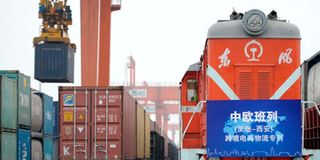China shows Belt and Road Initiative hinges on security

A cross-border e-commerce freight train from Hamburg, Germany arriving in Xi'an, northwest China's Shaanxi Province. China is showing its ambitious Belt and Road Initiative could still shift the ground if Beijing feels there is lack of security.
China is showing its ambitious Belt and Road Initiative (BRI) — a vision to connect Asia, Africa and Europe via infrastructure — could still shift the ground if Beijing feels there is lack of security.
The details emerged last week after Chinese officials pressed Pakistan, one of the countries on the BRI route, to contain a spate of terrorist attacks that targeted Chinese installations over the past months, and which left dozens of its nationals dead.
China’s Deputy Director for the National Development and Reform Commission Ning Jizhe asked for “high-quality operations under high-level security guarantees” in order to turn investments in Pakistan into an example for other countries targeted on the route.
China’s Global Times reported revelations from a joint meeting of Pakistan and Chinese officials over the status of the China-Pakistan Economic Corridor (CPEC), a pool of infrastructure projects currently under construction since 2013. The projects which include expanded highways, ports and railways could cost up to $62 billion when completed, and the Chinese have reportedly pumped in $25.4 billion to construct roads, port, energy plants and industrial parks.
The idea for the projects is that they eventually connect China through Pakistan to neighbouring Iran and Afghanistan that “will result in well connected, integrated region of shared destiny, harmony and development,” according to a mission statement on the Corridor’s website. That could link up with other projects on the BRI, including connections to Africa and Europe.
The BRI is Beijing’s blue print linking up more than 70 countries in these regions, and touches on the eastern Africa coastline in Kenya and Djibouti with infrastructure projects mainly built through bank loans from China.
Traditionally, China has often stayed out of local political situation in those countries.
Security question
In Pakistan, the question of security has been persistent, at least going by Chinese officials’ public sentiments. Last month, a suicide bomber targeted a motorcade carrying Chinese nationals on an expressway being built by the Chinese. It killed one worker and two children.
A previous attack on a bus in northern Pakistan in July had left nine Chinese nationals dead. Both sides condemned the attacks, but Beijing expressed discomfort with investing more unless there were security assurances.
Last month, Chinese State Councillor and Minister of Public Security Zhao Kezhi called for adequate investigations after several terror attacks targeted Chinese nationals. He called for “the truth behind the Dasu terrorist attack, fully fix the security loopholes and enhance protection measures to ensure all the Chinese nationals and projects in Pakistan are safe,” according to a statement published by state-run media in China, after he met virtually with Moeed Yusuf, the national security adviser to the prime minister of Pakistan.
Karachi port
One of the projects that could depend on security is the ambitious $3.5 billion overhaul of Karachi port to have new berths for the port, a new fishery port and a harbour bridge.
On Thursday, the Dawn newspaper reported that the project known as the Karachi Coastal Comprehensive Development Zone (KCCDZ) had been approved.
“And the best thing of this project is that it’s solely based on foreign (Chinese) investment without any loan,” said Minister for Maritime Affairs Syed Ali Zaidi argued.
The official indicated it could take five years to complete.
“It’s something massive. It would bring multi-fold advantages to Pakistan’s maritime economy and further strengthen our coastal development.”
But the announcement by Pakistan, which the Chinese did not publicise, came two weeks after Chinese businesspeople demanded adequate security for their investments in the country.
Prime Minister Imran Khan pledged to review the security situation monthly, after admitting insecurity had delayed some of the projects under the Corridor. According to his office, some of the businesses he met with included Shanghai Challenge Textile Co, Easy Prefabricated Homes Pvt, and OPPO.
Behind schedule
Though Beijing vows to continue with the projects, some of the components have been behind schedule due to security concerns and local protests especially on relocation.
In turn, China has in the past pushed for special business zones, including special committees to directly approve decisions and enhance security, as well as other privileges that will guarantee adequate protection of investments. Pakistani officials admit the investments will require higher security. Planning and development Minister Asad Umar tweeted that the Corridor will need “the level of security commensurate with the global profile of this project”.
But even with the Corridors, governments will still need to calm local stakeholders like businesspeople. Farhatullah Babar, a former Pakistani senator claimed his country had not provided “answers” to the nature of the projects and how it benefits both sides.
“False hopes, vague promises has become hallmark of government,” he tweeted on Sunday.
“Full explanation about KCCDZ must be given and immediately.”





